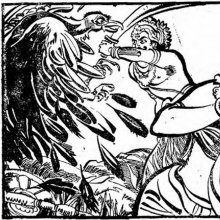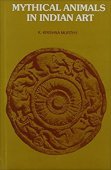Mule, Mūle: 3 definitions
Introduction:
Mule means something in Buddhism, Pali, Hinduism, Sanskrit. If you want to know the exact meaning, history, etymology or English translation of this term then check out the descriptions on this page. Add your comment or reference to a book if you want to contribute to this summary article.
Images (photo gallery)
In Buddhism
Tibetan Buddhism (Vajrayana or tantric Buddhism)
Source: academia.edu: The Structure and Meanings of the Heruka MaṇḍalaThe Mule (animal) is associated with the Yoginī (female deity) named Vesarā, being situated in the Medinīcakra, according to the 10th century Ḍākārṇava-tantra: one of the last Tibetan Tantric scriptures belonging to the Buddhist Saṃvara tradition consisting of 51 chapters.—Accordingly, the medinīcakra refers to one of the three divisions of the dharma-puṭa (‘dharma layer’), situated in the Herukamaṇḍala. The 36 pairs of Ḍākinīs [viz., Vesarā] and Vīras are yellow in color; the shapes of their faces are in accordance with their names [e.g., Mule]; they have four arms; they hold a skull bowl, a skull staff, a small drum, and a knife.

Tibetan Buddhism includes schools such as Nyingma, Kadampa, Kagyu and Gelug. Their primary canon of literature is divided in two broad categories: The Kangyur, which consists of Buddha’s words, and the Tengyur, which includes commentaries from various sources. Esotericism and tantra techniques (vajrayāna) are collected indepently.
Languages of India and abroad
Sanskrit dictionary
Source: Cologne Digital Sanskrit Dictionaries: Edgerton Buddhist Hybrid Sanskrit DictionaryMūle (मूले).—(compare mūlaṃ mūlāto; Pali uses mūle sometimes in ways corresponding to some of these mgs., see Childers, [Page437-b+ 71] dvāramūle ṭhito, at the door), as postpos. with. gen., or rarely at end of a [compound], may be used as periphrasis for loc. of governed noun in any sense: (1) under (here doubt- less with persistence of lit. meaning of mūla), in pāda-mūle, under the foot: so kāṇḍo (mss. kaṇṭho) tasya rājño pāda- mūle sthitvā Mahāvastu ii.82.15, the arrow, stopping under that king's foot; mama pādamūle…nipatito 18; (2) near (of location): in composition, dvāramūle Aṣṭasāhasrikā-prajñāpāramitā 502.4; bhaṇḍa-mūle Mahāvastu ii.172.1, 2, near the arbor, see bhaṇḍa; with gen., tena…brāhmaṇānāṃ mūle sthitakena Mahāvastu i.310.15, staying near (with) the brahmans; varaṃ tava mūle mṛtaṃ na Viśākhamūle jīvitaṃ (in the 2d form, a [compound]) 365.20, better to die with you (in your company) than to live with V.; ṛṣisya mūle ii.96.19; 210.4, in the presence of the ṛṣi; (hastino, mss. °nā) mūle 454.5; (rathānāṃ) mūle (mss.) āsati 456.19; mālākārasya mūle 463.20; (3) towards, to (of motion): mama mūla (Senart em. mūle!) āgatā Mahāvastu i.364.22, she came to me; devīya mūle na kiṃcid aparityak- taṃ ii.66.8, there was nothing that was not handed over to the queen; gato Brahmāyusya mūle 78.16, went to Brah- māyu(s); kumbhakāramahattarasya mūle allīno 464.1, and similarly 19, 470.6; praviṣṭo devīya mūle iii.25.11; (4) towards, in reference to (of respect, disrespect, love, regard): brāhmaṇānāṃ mūle abahumānam Mahāvastu i.309.15, disrespect for the brahmans; devīya mūla (mss., read mūli? meter requires short syllable; Senart mūle) i.204.16 = māyāya mūli ii.8.11 (verse), (obeisance) towards…; mama mūle premā (mss. °mnā; n. sg.) ii.65.15, love for me; rājaputrasya mūle premnaṃ iii.39.2; rākṣasīnāṃ mūle sāpekṣā 76.15—16, having regard for the ogresses; parasparasya mūle…prem- naṃ Mahāvastu iii.391.13.
Sanskrit, also spelled संस्कृतम् (saṃskṛtam), is an ancient language of India commonly seen as the grandmother of the Indo-European language family (even English!). Closely allied with Prakrit and Pali, Sanskrit is more exhaustive in both grammar and terms and has the most extensive collection of literature in the world, greatly surpassing its sister-languages Greek and Latin.
Kannada-English dictionary
Source: Alar: Kannada-English corpusMūle (ಮೂಲೆ):—
1) [noun] a direction, in the compass, between two main directions; any of the four directions, south-east, south-west, north-west and north-east.
2) [noun] the end or corner of anything.
3) [noun] a turn, curve.
4) [noun] the inner side of a building where two walls meet (usu. making an acute angle).
5) [noun] a very remote, unpopular place.
6) [noun] the extent of raise or descent between two straight lines, at the point of their intersection or joint on the same plane, measured either clockwise or anticlockwise, expressed in terms of degrees.
7) [noun] ಮೂಲೆಯಲ್ಲಿ ಕೂಡಿಸು [muleyalli kudisu] mūleyalli kūḍisu to make another powerless, useless; to make another sit helplessly idle; ಮೂಲೆಗೆ ತಳ್ಳು [mulege tallu] mūlege taḷḷu = ಮೂಲೆಯಲ್ಲಿ ಕೂಡಿಸು [muleyalli kudisu]; 2. to dismiss from consideration; to brush aside; ಮೂಲೆಗೆ ನೂಕು [mulege nuku] mūlege nūku = ಮೂಲೆಯಲ್ಲಿ ಕೂಡಿಸು [muleyalli kudisu]; ಮೂಲೆಯಲ್ಲಿ ಕೂರು [muleyalli kuru] mūlege kūru to become useless or powerless; to sit idly; ಮೂಲೆ ಪಾಲಾಗು [mule palagu] mūle pālāgu to be made or become powerless; to have no say in; ಮೂಲೆ ಪಾಲು ಮಾಡು [mule palu madu] mūle pālu māḍu = ಮೂಲೆಯಲ್ಲಿ ಕೂಡಿಸು [muleyalli kudisu]; ಮೂಲೆ ಮುಡುಕು [mule muduku] mūle muḍuku a narrow lane or place.
--- OR ---
Mūḷe (ಮೂಳೆ):—
1) [noun] any of the separate parts of the hard connective tissue forming the skeleton of most full-grown vertebrate animals; a bone.
2) [noun] ಮೂಳೆಯಿಲ್ಲದ ನಾಲಿಗೆ [muleyillada nalige] mūḷeyillada nālige the tendency of changing one’s words, promise without any moral or ethical compunction; ಮೂಳೆ ಬಿಟ್ಟುಕೊಳ್ಳು [mule bittukollu] mūḷe biṭṭukoḷḷu = ಮೂಳೆ ಚಕ್ಕಳವಾಗು [mule cakkalavagu]; ಮೂಳೆ ಚಕ್ಕಳವಾಗು [mule cakkalavagu] mūḷe cakkaḷavāgu to become emaciated; to become a bag of bones.
--- OR ---
Mūḷe (ಮೂಳೆ):—[noun] = ಮೂಳಿ [muli] = 1, 2 , 3, 5 & 6.
Kannada is a Dravidian language (as opposed to the Indo-European language family) mainly spoken in the southwestern region of India.
See also (Relevant definitions)
Starts with (+16): Mule tail, Mulea, Mulebe, Muleduppa, Muleelin, Mulega, Mulegallu, Mulegamba, Mulegomgadi, Mulegumpu, Mulehe, Muleke, Mulekebija, Mulela, Mulele, Mulele-kusu, Mulem, Mulema, Mulematha, Mulematta.
Ends with: Abhuktamule, Agnimule, Aimule, Atamule, Ayimule, Aymule, Bennumule, Caumule, Edemule, Gharagamule, Harimule, Isharmule, Kademule, Kivimule, Mummule, Padamule, Uwai semule.
Full-text (+120): Vesara, Ashvatara, Atibharaga, Nighrishva, Vegasara, Mishraja, Khencara, Assatara, Lida, Khesara, Vesari, Shingarum, Prakhara, Prakkhara, Dvijatiya, Ki mules, Adhvaga, Daun mules, Sakritagarbha, Sthulamula.
Relevant text
Search found 99 books and stories containing Mule, Mūḷe, Mūle; (plurals include: Mules, Mūḷes, Mūles). You can also click to the full overview containing English textual excerpts. Below are direct links for the most relevant articles:
Chandogya Upanishad (Madhva commentary) (by Srisa Chandra Vasu)
Fourth Adhyaya, Second Khanda (5 mantras)
Fifth Adhyaya, Eleventh through Twenty-fourth Khandas (36 mantras)
The Great Chronicle of Buddhas (by Ven. Mingun Sayadaw)
Part 2 - The Vālodaka Jātaka told by The Buddha on His arrival in Sāvatthi < [Chapter 31 - The Monk Sudinna, the Son of the Kalanda Merchant]
Part 10 - Story of Pokkharasāti Brahmin and Ambaṭṭha < [Chapter 35 - Story of Māra]
Animal Kingdom (Tiryak) in Epics (by Saranya P.S)
Chapter 1.13 - Special features of Animals and Birds
Chapter 4.16 - The Mule in the Epics
Chaitanya Bhagavata (by Bhumipati Dāsa)
Verse 1.15.132 < [Chapter 15 - Marriage with Śrī Viṣṇupriyā]
Verse 1.7.177 < [Chapter 7 - Śrī Viśvarūpa Takes Sannyāsa]
Verse 3.9.201 < [Chapter 9 - The Glories of Advaita]
Garga Samhita (English) (by Danavir Goswami)
Verse 2.15.24 < [Chapter 15 - Description of Śrī Rādhā-Kṛṣṇa’s Falling in Love]
Verse 4.3.12 < [Chapter 3 - The Story of the Mithilā Women]
Verse 6.1.27 < [Chapter 1 - Jarāsandha’s Defeat]
Related products

